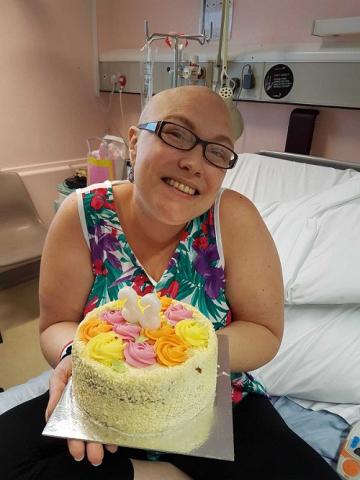
What is non-Hodgkin lymphoma?
Non-Hodgkin lymphoma is a type of blood cancer which causes your body to make too many white blood cells, called ‘lymphocytes’. Lymphocytes are a type of white blood cell which contribute to your immune system working well.
There are two types of lymphocytes:
- B-cell lymphocytes - Non-Hodgkin lymphoma commonly develops from B-cells.
- T-cell lymphocytes - Non-Hodgkin lymphoma can develop from T-cells, but it's less common.
The extra lymphocytes caused by non-Hodgkin lymphoma live longer than they should and stop other blood cells from doing their job. Overall, this means your immune system can’t work properly.
How many people are diagnosed with non-Hodgkin lymphoma?
In the UK, around 13,000 people are diagnosed with non-Hodgkin lymphoma every year.
It is most common in people over 75. It's also slightly more common in men than women.
Lymphomas are types of blood cancer that start in the lymphatic system. But non-Hodgkin refers to lymphomas that don’t have ‘Reed-Sternberg cells’ – a certain type of abnormal cell in the blood. These large, distinct cells are only found in people with Hodgkin lymphoma.
Treatments for non-Hodgkin lymphoma
In many cases, doctors will try to treat non-Hodgkin lymphoma using:
- chemotherapy
- radiotherapy
- targeted cancer drugs
- steroids
- stem cell transplant (after chemotherapy).
You might only have one type of treatment, or you might have a combination of treatments.
If you need a stem cell transplant for non-Hodgkin lymphoma, doctors will usually offer an autologous stem cell transplant – a transplant using your own stem cells. This is because:
- You usually have a better chance of keeping the lymphoma in remission for longer. Remission means there are no longer any signs of cancer in your body.
- There are usually fewer complications, such as graft versus host disease (GvhD), because you don’t have a donor giving your body new stem cells.
If you do relapse, you might have a second transplant, but it will be an allogeneic transplant. This is when someone else donates their cells.
In some cases, your medical team might offer you an allogeneic transplant first of all if:
- you’ve already had another treatment but it didn’t work
- the non-Hodgkin lymphoma has returned quickly
- or doctors think that chemotherapy won’t work well for the type of lymphoma you have.
How many people have a stem cell transplant to treat non-Hodgkin lymphoma?
There were 632 stem cell transplants in the UK to treat non-Hodgkin lymphoma in 2023.
Where to find support for non-Hodgkin lymphoma
Anthony Nolan supports people with all sorts of conditions that might use stem cells or cell therapies for treatment. But other organisations support people affected by specific blood cancers like non-Hodgkin lymphoma.
To find out more about non-Hodgkin lymphoma symptoms, diagnosis and treatments, you can visit:
- Blood Cancer UK – non-Hodgkin lymphoma
- Cancer Research UK – non-Hodgkin lymphoma
- Lymphoma Action – non-Hodgkin lymphoma
Waldenstrom's macroglobulinaemia (WM) is another type of non-Hodgkin's lymphoma.
You can get information and support for WM on the WMUK website.
To find advice and support for living with cancer, you can visit:

The doctors told me I could have treatment to reduce the non-Hodgkin lymphoma. Unfortunately after each treatment the cancer came back more aggressively. That’s when they said I needed a stem cell transplant.
Donna, who had a stem cell transplant to treat non-Hodgkin lymphoma. You can read her story on our blog.
